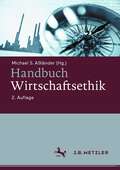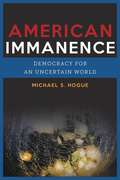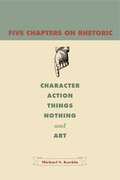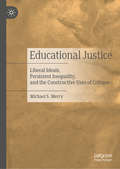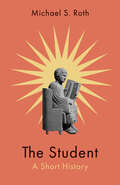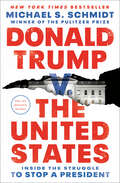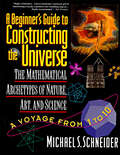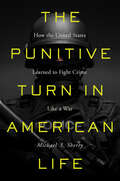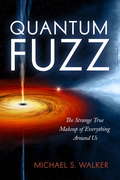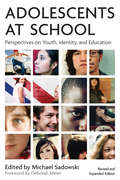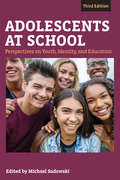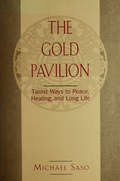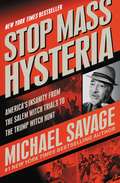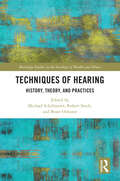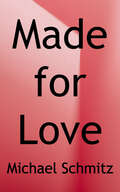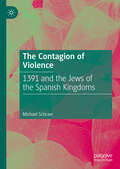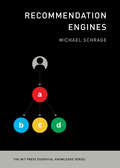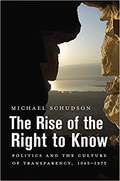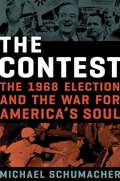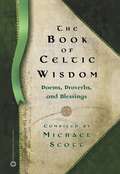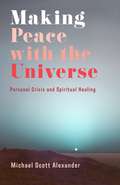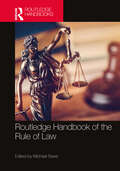- Table View
- List View
Handbuch Wirtschaftsethik
by Michael S. AßländerKlimawandel, Ressourcenknappheit und Umweltschutz, Armutsmigration, Ungleichheit, prekäre Beschäftigungsverhältnisse und Menschenrechte, aber auch Big Data und die digitalisierungsbedingte Veränderung der Arbeitswelt sind die alten und neuen Herausforderungen, denen sich die Wirtschafts- und Unternehmensethik stellen muss. Das Handbuch bietet einen umfassenden Überblick über die wirtschaftsethischen Standards von der Antike bis in unsere unmittelbare Gegenwart und soll Orientierung durch Reflexion, Methoden und kritische Analyse bieten. Für die 2. Auflage wurde das Handbuch umfassend aktualisiert und erheblich erweitert.
American Immanence: Democracy for an Uncertain World (Insurrections: Critical Studies in Religion, Politics, and Culture)
by Michael S. HogueThe Anthropocene marks the age of significant human impact on the Earth’s ecosystems, dramatically underscoring the reality that human life is not separate from nature but an integral part of it. Culturally, ecologically, and socially destructive practices such as resource extraction have led to this moment of peril. These practices, however, implicate more than industrial and economic systems: they are built into the political theology of American exceptionalism, compelling us to reimagine human social and political life on Earth. American Immanence seeks to replace the dominant American political tradition, which has resulted in global social, economic, and environmental injustices, with a new form of political theology, its dominant feature a radical democratic politics. Michael S. Hogue explores the potential of a dissenting immanental tradition in American religion based on philosophical traditions of naturalism, process thought, and pragmatism. By integrating systems theory and concepts of vulnerability and resilience into the lineages of American immanence, he articulates a political theology committed to democracy as an emancipatory and equitable way of life. Rather than seeking to redeem or be redeemed, Hogue argues that the vulnerability of life in the Anthropocene calls us to build radically democratic communities of responsibility, resistance, and resilience. American Immanence integrates an immanental theology of, by, and for the planet with a radical democratic politics of, by, and for the people.
Five Chapters on Rhetoric: Character, Action, Things, Nothing, and Art
by Michael S. KochinMichael Kochin’s radical exploration of rhetoric is built around five fundamental concepts that illuminate how rhetoric functions in the public sphere. To speak persuasively is to bring new things into existence—to create a political movement out of a crowd, or an army out of a mob. Five Chapters on Rhetoric explores our path to things through our judgments of character and action. It shows how speech and writing are used to defend the fabric of social life from things or facts. Finally, Kochin shows how the art of rhetoric aids us in clarifying things when we speak to communicate, and helps protect us from their terrible clarity when we speak to maintain our connections to others.Kochin weaves together rhetorical criticism, classical rhetoric, science studies, public relations, and political communication into a compelling overview both of persuasive strategies in contemporary politics and of the nature and scope of rhetorical studies.
Five Chapters on Rhetoric: Character, Action, Things, Nothing, and Art (G - Reference, Information and Interdisciplinary Subjects)
by Michael S. KochinMichael Kochin’s radical exploration of rhetoric is built around five fundamental concepts that illuminate how rhetoric functions in the public sphere. To speak persuasively is to bring new things into existence—to create a political movement out of a crowd, or an army out of a mob. Five Chapters on Rhetoric explores our path to things through our judgments of character and action. It shows how speech and writing are used to defend the fabric of social life from things or facts. Finally, Kochin shows how the art of rhetoric aids us in clarifying things when we speak to communicate, and helps protect us from their terrible clarity when we speak to maintain our connections to others.Kochin weaves together rhetorical criticism, classical rhetoric, science studies, public relations, and political communication into a compelling overview both of persuasive strategies in contemporary politics and of the nature and scope of rhetorical studies.
Educational Justice: Liberal Ideals, Persistent Inequality, and the Constructive Uses of Critique
by Michael S. MerryThis book examines the philosophical, motivational, and practical challenges of education theory, policy, and practice in the twenty-first century. There is a loud and persistent drum beat of support for schools, for citizenship, for diversity and inclusion, and increasingly for labor market readiness with very little critical attention to the assumptions underlying these agendas, let alone to their many internal contradictions. Merry does not neglect the historical, comparative international context so essential to better understanding where we are, as well as what is attainable in terms of educational justice. He argues that we must constructively critique some of our most cherished beliefs about education if we are to save the hope of real justice from the rhetoric of imagined justice.
The Student: A Short History
by Michael S. RothFrom the president of Wesleyan University, an illuminating history of the student, spanning from antiquity to Zoom In this sweeping book, Michael S. Roth narrates a vivid and dynamic history of students, exploring some of the principal models for learning that have developed in very different contexts, from the sixth century BCE to the present. Beginning with the followers of Confucius, Socrates, and Jesus and moving to medieval apprentices, students at Enlightenment centers of learning, and learners enrolled in twenty-first-century universities, he explores how students have been followers, interlocutors, disciples, rebels, and children becoming adults. There are many ways to be a student, Roth argues, but at their core is developing the capacity to think for oneself by learning from others, and thereby finding freedom. In an age of machine learning, this book celebrates the student who develops more than mastery, cultivating curiosity, judgment, creativity, and an ability to keep learning beyond formal schooling. Roth shows how the student throughout history has been someone who interacts dynamically with the world, absorbing its lessons and creatively responding to them.
Donald Trump v. The United States: Inside the Struggle to Stop a President
by Michael S. SchmidtWith unparalleled reporting, a Pulitzer Prize–winning New York Times reporter continues to break news about the most important political story of our lives as he chronicles the clash between a president and the officials of his own government who tried to stop him. <p><p> In the early days of the Trump presidency, the people who work in the institutions that make America America saw Trump up close in the Oval Office and became convinced that they had to stand up to an unbound president. These officials faced a situation without parallel in American history: What do you do, and who do you call, if you are the only one standing between the president, his extraordinary powers, and the abyss? <p> Michael S. Schmidt’s Donald Trump v. The United States tells the dramatic, high-stakes story of those who felt compelled to confront and try to contain the most powerful man in the world as he shredded norms and sought to expand his power. <p> Schmidt has broken many of the major stories of the Trump era, from the news of Hillary Clinton’s use of a personal email account to the report on former FBI director James Comey’s contemporaneous memos of conversations with Trump that led directly to the appointment of special counsel Robert S. Mueller III. Now he takes us inside the defining events of the presidency, chronicles them up close, and records the clash between an increasingly emboldened president and those around him, who find themselves trying to thwart the president they had pledged to serve, unsure whether he is acting in the interest of the country, his ego, his family business, or Russia. Through their eyes and ears, we observe an epic struggle. <p> Drawing on secret FBI and White House documents and confidential sources inside federal law enforcement and the West Wing, Donald Trump v. The United States is vital journalism, recording the shocking reality of a presidency like no other, a riveting contemporary history, and a lasting account of just how fragile and vulnerable the institutions of American democracy really are. <p> <b>A New York Times Bestseller</b>
A Beginner's Guide to Constructing the Universe: The Mathematical Archetypes of Nature, Art, and Science
by Michael S. SchneiderDiscover how mathematical sequences abound in our natural world in this definitive exploration of the geography of the cosmosYou need not be a philosopher or a botanist, and certainly not a mathematician, to enjoy the bounty of the world around us. But is there some sort of order, a pattern, to the things that we see in the sky, on the ground, at the beach? In A Beginner's Guide to Constructing the Universe, Michael Schneider, an education writer and computer consultant, combines science, philosophy, art, and common sense to reaffirm what the ancients observed: that a consistent language of geometric design underpins every level of the universe, from atoms to galaxies, cucumbers to cathedrals. Schneider also discusses numerical and geometric symbolism through the ages, and concepts such as periodic renewal and resonance. This book is an education in the world and everything we can't see within it.Contains numerous b&w photos and illustrations.
The Punitive Turn in American Life: How the United States Learned to Fight Crime Like a War
by Michael S. SherryIn 1965, President Lyndon Johnson insisted that "the policeman is the frontline soldier in our war against crime," and police forces, arms makers, policy makers, and crime experts heeded this call to arms, bringing weapons and practices from the arena of war back home. The Punitive Turn in American Life offers a political and cultural history of the ways in which punishment and surveillance have moved to the center of American life and become imbued with militarized language and policies. Michael S. Sherry argues that, by the 1990s, the "war on crime" had been successfully broadcast to millions of Americans at an enormous cost--to those arrested, imprisoned, or killed and to the social fabric of the nation--and that the currents of vengeance that ran through the punitive turn, underwriting torture at home and abroad, found a new voice with the election of Donald J. Trump. By 2020, the connections between war-fighting and crime-fighting remained powerful, evident in campaigns against undocumented immigrants and the militarized police response to the nationwide uprisings after George Floyd's murder. Stoked by "forever war," the punitive turn endured even as it met fiercer resistance. From the racist system of mass incarceration and the militarization of criminal justice to gated communities, public schools patrolled by police, and armies of private security, Sherry chronicles the United States' slide into becoming a meaner, punishment-obsessed nation.
Quantum Fuzz: The Strange True Makeup of Everything Around Us
by Michael S. WalkerQuantum physics has turned our commonsense notion of reality on its head. This accessible book describes in layperson's terms the strange phenomena that exist at the quantum level--a world of tiny dimensions where nothing is absolutely predictable, where we rethink causality, and information seemingly travels faster than light. The author, a veteran physicist, uses illuminating analogies and jargon-free language to illustrate the basic principles of the subatomic world and show how they explain everything from the chemistry around us to the formation of galaxies. He also explains how scientists and engineers interact with this nebulous reality and, despite its mysteries, achieve results of great precision. Up front is a brief history of the early 20th-century "quantum revolution," focusing on some of the brilliant individuals whose contributions changed our view of the world--Albert Einstein, Niels Bohr, Paul Dirac, Werner Heisenberg, Erwin Schroedinger, and others. The work concludes with a discussion of the many amazing inventions that have resulted from quantum theory, including lasers, semiconductors, and the myriad of electronic devices that use them. Lucidly written, this book conveys the excitement of discovery while expanding the reader's appreciation for a science that explores the basis of everything we know.From the Hardcover edition.
Adolescents at School, Second Edition: Perspectives on Youth, Identity, and Education (Youth Development And Education Ser.)
by Michael SadowskiAs any teacher or parent knows, adolescence is a time when youth grapple with the question, &“Who am I?&” Issues of race, ethnicity, class, gender, sexual orientation, and ability can complicate this question for young people, affecting their schoolwork and their relationships with teachers, family, and peers. This new edition of Adolescents at School builds and expands the strengths and insights of the much-acclaimed first edition. Drawing from the perspectives of teachers, researchers, and administrators—and adolescents themselves—it examines the complex, changing identities young people manage while they confront the challenges of schools. A uniquely practical, insightful, and jargon-free volume, Adolescents at School points to ways to foster the success of every student in our schools and classrooms.
Adolescents at School, Third Edition: Perspectives on Youth, Identity, and Education (Youth Development and Education Series)
by Michael SadowskiAdolescents at School brings together the perspectives of scholars, educators, and researchers to address the many issues that affect adolescents&’ emerging identities, especially in relation to students&’ experience of and engagement with school. The book offers current and preservice teachers a practical understanding of the concept of identity development, particularly as impacted by such factors as race, ethnicity, gender, sexual orientation, ability/disability, immigration, and social class. This third edition includes new chapters on boys&’ emotional lives, risk and resilience in girls, the experiences of undocumented immigrant students, Muslim-American youth, and income inequality; features on &“teaching while white&”; and an extensively updated chapter on LGBTQ+ students. The book expands on the strengths and insights of the previous editions while also touching on issues highly relevant to contemporary youth such as social media, youth activism, and immigration. A practical and insightful volume, Adolescents at School points to ways to foster the success of every student in our schools and classrooms.
The Gold Pavilion
by Michael SasoThe Gold Pavilion: Taoist Ways to Peace, Health, and Long Life is astep-by-step description of a way of Taoist meditation from ancient China.This book proposes a way to find inner peace and wholeness in a world with little time for quiet contemplation.
The Gold Pavilion
by Michael SasoThe Gold Pavilion: Taoist Ways to Peace, Health, and Long Life is astep-by-step description of a way of Taoist meditation from ancient China.This book proposes a way to find inner peace and wholeness in a world with little time for quiet contemplation.
Stop Mass Hysteria: America's Insanity from the Salem Witch Trials to the Trump Witch Hunt
by Michael SavageIn his new book, STOP MASS HYSTERIA, #1 NYT bestselling author Michael Savage calls out the mass hysteria mongers and their methods, and shows Americans that we must look to history to understand the present and avoid repeating the mistakes of the past. <P><P>Since Donald Trump's historic ascendance to the presidency, American politics have reached a boiling point. Social and economic issues, even national security, have become loud, violent flashpoints for political rivals in the government, in the media and on the streets. This collective derangement has a name: mass hysteria. <P><P>In his new book, STOP MASS HYSTERIA, #1 New York Times bestselling author Michael Savage not only deconstructs the Left's unhinged response to traditional American values like borders, language, and culture, but takes the reader on an unprecedented journey through mass hysteria's long history in the United States. From Christopher Columbus to the Salem Witch trials to the so-called "Red Scares" of the 1930s and 40s and much more, Dr. Savage recounts the many times collective insanity has gripped the American public - often prompted by sinister politicians with ulterior motives. <P><P>Dr. Savage provides vital context for the common elements of dozens of outbreaks of mass hysteria in the past, their causes, their short and long-term effects, and the tactics of the puppet masters who duped gullible masses into fearing threats both real and imagined. By shining a light on the true nature and causes of American mass hysteria in the past, Savage provides an insightful look into who and what is causing dangerous unrest in our lives - and why. <P><b>A New York Times Bestseller</b>
Techniques of Hearing: History, Theory and Practices
by Michael Schillmeier, Robert Stock, and Beate OchsnerHearing, health and technologies are entangled in multi-faceted ways. The edited volume addresses this complex relationship by arguing that modern hearing was and is increasingly linked to and mediated by technological innovations. By providing a set of original interdisciplinary investigations that sheds new light on the history, theory and practices of hearing techniques, it is able to explore the heterogeneous entanglements of sound, hearing practices, technologies and health issues. As the first book to bring together historians, scholars from media studies, social sciences, cultural studies, acoustics and neuroscientists, the volume discusses modern technologies and their decisive impact on how ‘normal’ hearing, enhanced and smart hearing as well as hearing impairment have been configured. It brings both new insights into the histories of hearing technologies as well as allowing us to better understand how enabling hearing technologies have currently been unfolding an increasingly hybrid ecology engaging smart hearing devices and offering stress-free hearing and acoustic wellbeing in novel auditory environments. The volume will be of interest to all scholars and students of disability studies, sound studies, sociology of health and illness, medical history, health and society as well as those interested in the practices and techniques of self-monitored and smart hearing.
Made for Love: Same-Sex Attraction and the Catholic Church
by Michael SchmitzIn Made for Love, Fr. Michael Schmitz presents the Catholic teaching on same-sex attraction and same-sex "sexual" relations. <p><p>He begins by giving background information regarding the different worldviews of the human person, the philosophical ideas of nature and purpose, the differences between objective and subjective truth, the principal of non-contradiction, and the fallen human nature that resulted from Original Sin. He then discusses in great detail the nature and ends of human sexuality and the nature of true love, while, in a compassionate and non-judgmental way, explaining the flawed nature of same-sex "sexual" relations. <p><p>While this book is intended primarily for those who have same-sex attraction and their family and friends, its presentation of the compassionate truth of Catholic teaching on same-sex attraction will be of great benefit to everyone in today's society.
The Contagion of Violence: 1391 and the Jews of the Spanish Kingdoms
by Michael SchraerThis book explores the causes, progression and consequences of the extraordinary spread of anti-Jewish violence and mass conversion across five separate Spanish polities in 1391, from Seville to the Pyrenees, overwhelming Valencia, Barcelona and numerous other locations. Using comparative analysis with previous outbreaks in Spain and elsewhere, it demonstrates the uniqueness of these events in terms of the speed and extent of transmission of attacks, and their lasting consequences. It argues that models of social contagion best explain this pandemic violence, in which latent hostilities, fears and uncertainties in the post-Black Death world, national and local tensions, were almost spontaneously triggered into often annihilatory riots by rapid communication and movement of people, spreading ideas, news, gossip and rumour through a variety of social networks. It seeks to demonstrate the modes by which polemic and tropes were translated into action, by local preachers, poetry, troubadours and the visual arts.
Recommendation Engines (The MIT Press Essential Knowledge series)
by Michael SchrageHow companies like Amazon, Netflix, and Spotify know what "you might also like": the history, technology, business, and societal impact of online recommendation engines.Increasingly, our technologies are giving us better, faster, smarter, and more personal advice than our own families and best friends. Amazon already knows what kind of books and household goods you like and is more than eager to recommend more; YouTube and TikTok always have another video lined up to show you; Netflix has crunched the numbers of your viewing habits to suggest whole genres that you would enjoy. In this volume in the MIT Press's Essential Knowledge series, innovation expert Michael Schrage explains the origins, technologies, business applications, and increasing societal impact of recommendation engines, the systems that allow companies worldwide to know what products, services, and experiences "you might also like."
The Rise of the Right to Know: Politics and the Culture of Transparency, 1945-1975
by Michael SchudsonModern transparency dates to the 1950s, 1960s, and 1970s--well before the Internet. Michael Schudson shows how the "right to know" has defined a new era for democracy--less focus on parties and elections, more pluralism and more players, year-round monitoring of government, and a blurring line between politics and society, public and private.
The Contest: The 1968 Election and the War for America's Soul
by Michael SchumacherA dramatic, deeply informed account of one of the most consequential elections and periods in American history 1968—rife with riots, assassinations, anti–Vietnam War protests, and realpolitik—was one of the most tumultuous years in the twentieth century, culminating in one of the most consequential presidential elections in American history. The Contest tells the story of that contentious election and that remarkable year. Bringing a fresh perspective to events that still resonate half a century later, this book is especially timely, giving us the long view of a turning point in American culture and politics.Author Michael Schumacher sets the stage with a deep look at the people with important roles in the unfolding drama: Lyndon B. Johnson, Robert F. Kennedy, Eugene McCarthy, George Wallace, Richard Nixon, and especially Hubert H. Humphrey, whose papers and journals afford surprising new insights. Following these politicians in the lead-up to the primaries, through the chaotic conventions, and down the home stretch to the general election, The Contest combines biographical and historical details to create a narrative as intimate in human detail as it is momentous in scope and significance.An election year when the competing forces of law and order and social justice were on the ballot, the Vietnam War divided the country, and the liberal regime begun with Franklin D. Roosevelt was on the defensive, 1968 marked a profound shift in the nation&’s culture and sense of itself. Thorough in its research and spellbinding in the telling, Schumacher&’s book brings sharp focus to that year and its lessons for our current critical moment in American politics.
Space and Society in the Greek and Roman Worlds
by Michael ScottWe cannot properly understand history without a full appreciation of the spaces through which its actors moved, whether in the home or in the public sphere, and the ways in which they thought about and represented the spaces of their worlds. In this book Michael Scott employs the full range of literary, epigraphic and archaeological evidence in order to demonstrate the many different ways in which spatial analysis can illuminate our understanding of Greek and Roman society and the ways in which these societies thought of, and interacted with, the spaces they occupied and created. Through a series of innovative case studies of texts, physical spaces and cultural constructs, ranging geographically across North Africa, Greece and Roman Italy, as well as an up-to-date introduction on spatial scholarship, this book provides an ideal starting point for students and non-specialists.
The Book of Celtic Wisdom: Poems, Proverbs, and Blessings
by Michael ScottThe Book of Celtic Wisdom is a collection of the poems, proverbs, and aphorisms of the Celtic people that have been passed down from generation to generation for thousands of years. These are the proverbs and blessings that bring the wisdom of the ancient Celts to life. Their thoughts on charity ("Stretch out your hand in giving, and you will never stretch it out in need"), aging ("The older the fiddle, the sweeter the tune"), and work ("The lazy young man and the poor old man; two sides of the same coin") are as relevant today as they were thousands of years ago. A thoughtful and reflective compilation, this book is bound to inspire, enlighten, and entertain readers every-where.
Making Peace with the Universe: Personal Crisis and Spiritual Healing
by Michael Scott AlexanderThe world’s great religious and philosophical traditions often include poignant testimonies of spiritual turmoil and healing. Following episodes of harrowing personal crisis, including addictions, periods of anxiety and panic, and reminders of mortality, these accounts then also describe pathways to consolation and resolution.In Making Peace with the Universe, Michael Scott Alexander reads diverse classic religious accounts as masterpieces of therapeutic insight. In the company of William James, Socrates, Muslim legal scholar turned mystic Hamid al-Ghazali, Chinggis Khan as described by the Daoist monk Qui Chuji, and jazz musician and Catholic convert Mary Lou Williams, Alexander traces the steps from existential crisis to psychological health. He recasts spiritual confessions as case histories of therapy, showing how they remain radical and deeply meaningful even in an age of scientific psychology. They record the therapeutic affect of spiritual experience, testifying to the achievement of psychological well-being through the cultivation of an edifying spiritual mood.Mixing scholarly learning with episodes from his own skeptical quest, Alexander demonstrates how these accounts of private terror and personal triumph offer a model of therapy through spiritual adventure. An interdisciplinary consideration of the shared terrain of religion and psychology, Making Peace with the Universe offers an innovative view of what spiritual traditions can teach us about finding meaning in the modern world.
Routledge Handbook of the Rule of Law (Routledge Handbooks in Law)
by Michael SevelThis Handbook provides a state-of-the-art survey of the study of the rule of law across law, the humanities, and social sciences, as well as insights into the practice of building the rule of law within and among states. Its 28 chapters are by many of the world’s leading scholars of the rule of law, as well as distinguished junior scholars, from a dozen countries and representing a number of academic disciplines. The chapters are ordered to progress, first, from theory to the practice of the rule of law and, second, from the rule of law within, to beyond, the state. They divide into three parts. The first part examines the concept, history, and value of the rule of law. This section considers the importance of political and intellectual history in shaping the concept over the centuries and takes novel philosophical approaches to the connection between the rule of law and other important ideals such as justice, equality, and civil disobedience. The second part transitions from theoretical studies to accounts of practical exercises in building the rule of law. The chapters consider the challenges of rule of law reform, including the use of local intermediaries facilitating interactions between international legal aid organizations and state governments, the challenges of legal translation across vastly different societies, the pathways of knowledge among the powerless about the protective potential of the rule of law, as well as the possible future for artificial intelligence systems in helping to reinforce rule-of-law principles. The third part examines the rule of law from a number of perspectives within particular supranational and national states, such as the European Union, China, Singapore, and South Africa, among others, and concludes by considering the prospects of the rule of law beyond the state, both within and among international institutions such as the United Nations, as well as non-territorial spaces like the world’s oceans. This Handbook is aimed at rule of law scholars across law, the humanities, and the social sciences, law and development practitioners, policymakers, and advanced students and researchers who seek a state-of-the-art overview of the history, theory, and practice of the rule of law.
